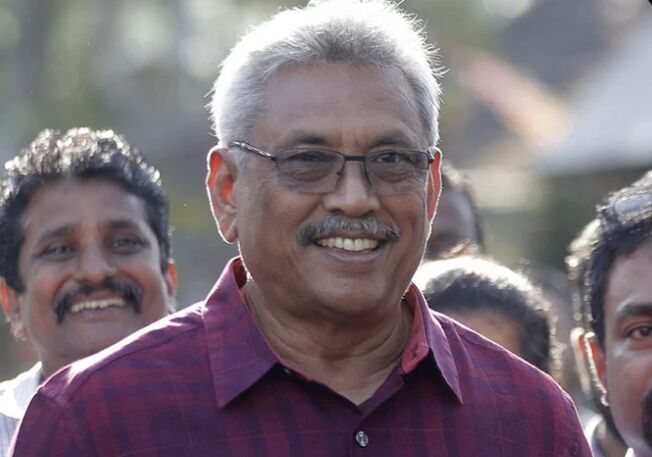Former Sri Lankan President Gotabaya Rajapaksa Denies Shocking Allegations of Assisting Extremists for Political Gain
Former Sri Lankan President Gotabaya Rajapaksa denies British television program's allegations linking him to Islamic State-inspired extremists behind 2019 suicide bomb attacks. Channel 4 documentary accused Rajapaksa of using the attacks to win the presidential election, which he dismisses as absurd.
Former Sri Lankan President Gotabaya Rajapaksa has vehemently denied allegations made in a British television program that suggested Islamic State-inspired extremists were used to carry out suicide bomb attacks in 2019 in order to create insecurity in the country and assist him in winning the presidential election. Rajapaksa dismissed these claims as absurd, stating that the documentary on Britain's Channel 4 television was "mostly an anti-Rajapaksa tirade." The program, which was broadcast on Tuesday, featured an interview with a man named Azad Maulana, who claimed to have facilitated a meeting between a local Islamic State-inspired extremist group called National Thowheed Jamath and a top state intelligence official loyal to Rajapaksa.
According to Maulana, this meeting was intended to formulate a plot to create instability and help Rajapaksa secure victory in the presidential election. Rajapaksa, a former senior defense official, was regarded as a strong law-and-order candidate. National Thowheed Jamath was responsible for carrying out six suicide bomb attacks on Easter Sunday in 2019, targeting churches and tourist hotels and resulting in the deaths of 269 individuals. These attacks served as a jolting reminder of the frequent suicide bombings that occurred during the country's lengthy civil war with the Tamil Tiger rebels, which had ended a decade earlier in 2009. The prevailing fears over national security were instrumental in Rajapaksa's successful bid for power. However, in July 2022, he was compelled to resign amid widespread protests over an economic crisis.
Maulana, who was interviewed by Channel 4, had previously acted as a spokesperson for a Tamil Tiger breakaway group that later transformed into a pro-state militia and played a crucial role in the government's triumph over the rebels during the civil war. Maulana claimed that, at the behest of his superior at the time, Sivanesathurai Chandrakanthan, who subsequently became a politician, he arranged a meeting in 2018 between Islamic State-inspired extremists and a high-ranking intelligence officer. This encounter was allegedly intended to explore the potential of creating instability. Maulana further asserted that Chandrakanthan, while in prison on murder charges, met with the brother of Zainee Hashim, the leader of National Thowheed Jamath, and recognized the group as a potential asset for generating instability.
According to Maulana, Chandrakanthan then arranged for his assistance in securing Hashim's release, providing him with legal and financial support. Following his release, Hashim is said to have organized a meeting between National Thowheed Jamath and a senior intelligence official closely associated with Rajapaksa. Maulana clarified that he did not participate in this meeting, but the intelligence officer supposedly informed him later that creating insecurity was the only way to reinstate the Rajapaksa family in power. After viewing security camera footage of the bombings, Maulana claimed that he recognized the attackers, who were carrying backpacks loaded with explosives, as individuals he had arranged to meet with the intelligence officer.
However, Chandrakanthan has not responded to calls requesting comment on the matter. In a speech delivered on Wednesday, he accused Maulana of fabricating the claims in order to secure approval for his asylum application in his current country of residence. Furthermore, Chandrakanthan highlighted that he was incarcerated at the time and questioned how he could have orchestrated a terrorist attack while in detention. Channel 4 disclosed that Maulana has been interviewed by United Nations investigators and European intelligence services regarding his assertions.
Rajapaksa asserted in his statement that he had no contact with the intelligence officer mentioned in the documentary from the time he stepped down as defense ministry secretary in 2015 until he assumed the presidency in 2019. He emphasized that the official was not affiliated with any intelligence agency during this period and that the allegations of their interaction with the suicide bombers were unfounded. Rajapaksa regarded Channel 4's latest film as a continuation of the network's previous efforts to besmirch the Rajapaksa family's legacy, comparing it to a prior documentary by the same channel that accused Sri Lankan soldiers of severe human rights violations in the final stages of the civil war.




